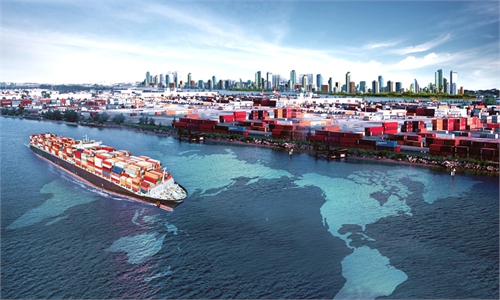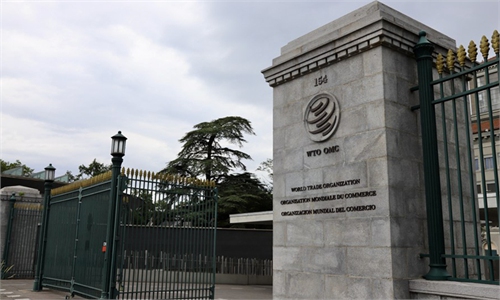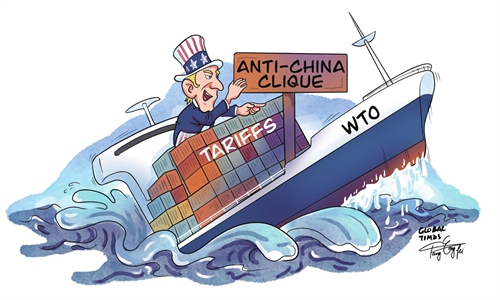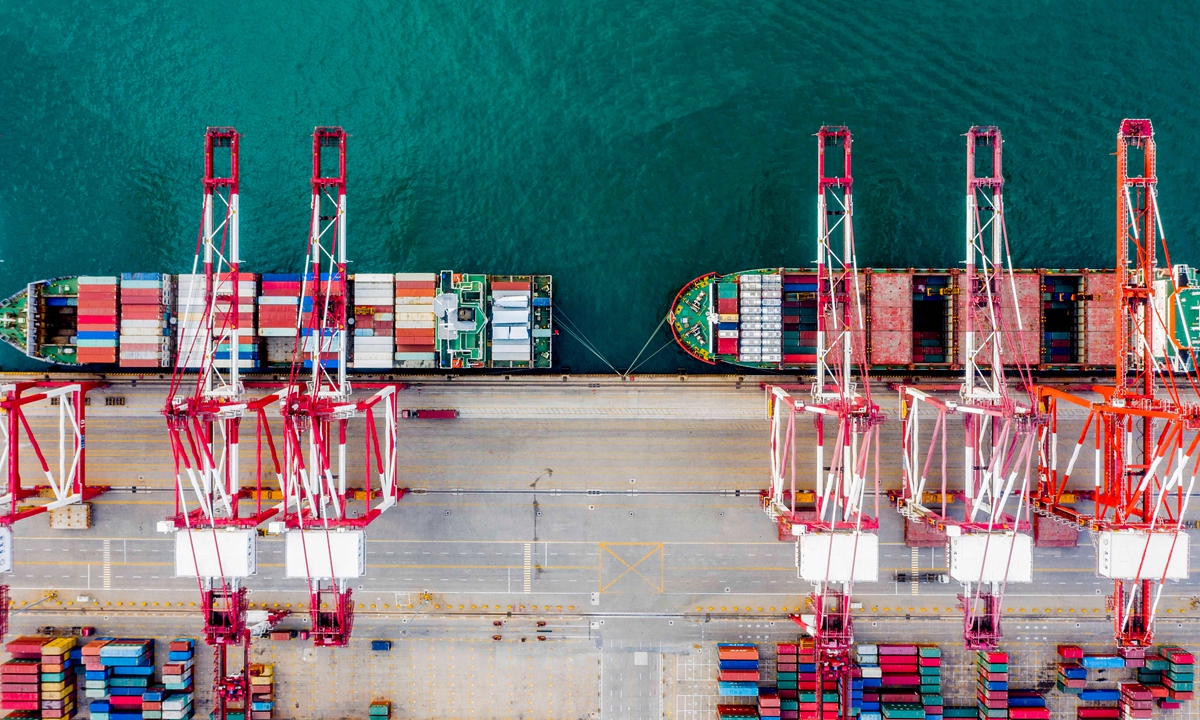
Container ships load and unload cargo at a berth in Qingdao Port, East China's Shandong Province, on July 6, 2021. Photo: IC
On December 11, 2001, China officially became a member of the World Trade Organization (WTO), turning a new page in the history of China's participation in economic globalization in a larger scope and at a deeper level.This was a hard-won day. The negotiations, which lasted 15 years, are known as the most complex and technically difficult tug-of-war in the history of the WTO, with many Chinese negotiators having fought from youth to old age.
This step has changed China and the entire world. Just like President Xi Jinping pointed out, "Since joining the WTO, China has kept opening wider to the world, thus generating a new wave of domestic development while injecting fresh impetus into the world economy."
Standing at the occasion of the 20th anniversary of China's accession to the WTO, the scene I witnessed in Doha, Qatar, replayed before my very eyes - at 23:39 Beijing time on November 10, 2001 in the Salva Conference Hall of the Sheraton Hotel Doha, when the members of the WTO adopted by unanimous consensus, the gavel fell lightly in the hands of Yussef Hussein Kamal, Chairperson of the Fourth WTO Ministerial Conference and then Minister of Finance, Economy and Trade of Qatar, marking the end of the 15-year process of China's negotiation for accession to the WTO.
Tough first step
The meeting in Doha, Qatar, in November 2001 was not an easy starting point for both China and the WTO.
On July 10, 1987, China applied to restore its status as a contracting party to The General Agreement on Tariffs and Trade (GATT). During the lengthy 15 years, Qian Jiadong, then permanent representative of China to the UN Office at Geneva and other International Organizations in Switzerland, and the Chinese delegation led by four chief negotiators - Shen Jueren, Tong Zhiguang, Gu Yongjiang, and Long Yongtu - delved into difficult negotiations. From October 22, 1987 to October 20, 1994, the GATT Working Party on China held 19 meetings.
On January 1, 1995, when the WTO replaced GATT, the GATT Working Party on China was renamed the WTO Working Party on China, and it held 18 meetings from March 22, 1996 to September 17, 2001. Long, who made more than 50 trips to Geneva for the negotiations, once said that the delegation had received enough mileage from airlines to fly to the moon.
The WTO's meeting was not without bumpy moments. The fourth WTO Ministerial Conference, scheduled for November 9-13, 2001 in Qatar, known as the "land of oil," would shape the future of the global system in the 21st Century, said then WTO Director General Mike Moore.
At that time, the WTO had been seriously shaken by the failure its Ministerial Conference of 1999 in Seattle two years earlier; the US, Europe, and Japan were showing economic recession prospects while the WTO predicted that the growth rate of global trade volume that year would slow down from 12 percent to 2 percent; and some developing countries failed to benefit from the Uruguay Round and thus enthusiastically expected development opportunities.
Against this background, restoring confidence in the WTO was an obvious priority, but also a tough one.
Moreover, it was just as the US military campaign against the Taliban in Afghanistan was escalating after the September 11 attacks. Calls were rising for holding the 2001 meeting in Singapore instead. But the conference organizing committee in Qatar made its utmost efforts to retain the opportunity, stressing to ensure all participants' safety. Its $30 million spending in preparation for the event finally paid off.
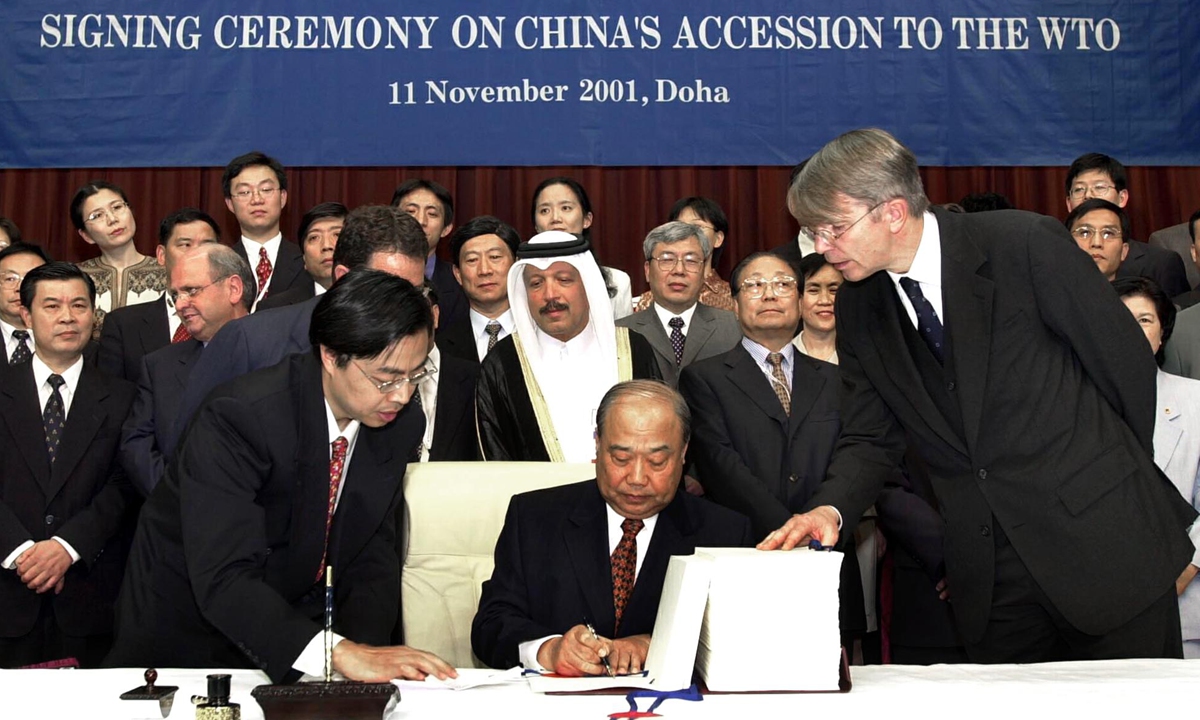
Shi Guangsheng (center), head of the Chinese delegation and then Chinese Minister of Foreign Trade and Economic Cooperation, signs documents at the signing ceremony of China's accession to the WTO in Doha, Qatar, on November 11, 2001. Photo: VCG
My journey to Doha was fraught with difficulties - US missiles fired into Afghanistan had deterred many flights from flying to the Middle East; the Qatar-based Al Jazeera television network had reportedly received a videotape of Al-Qaeda founder Osama bin Laden, prompting a flurry of speculations. I finally arrived in Doha on the morning of November 7, 2001 via a Qatar Airways red-eye flight.Among thousands of participants from all WTO members that arrived as scheduled, the Chinese delegation was undoubtedly the most eye-catching. Even I, a Chinese journalist who arrived early, became an interest of the international media.
Pleasant weekend night
Perhaps it was because the meeting was held in Doha that some international media outlets specifically used the local specialty condiments to describe the game at the WTO ministerial meeting as "full of peppery flavor."
In sharp contrast, the two agendas for China's accession to the WTO - the General Assembly vote on the evening of Saturday, November 10, and the signing ceremony on the evening of Sunday, November 11 - were full of jubilation. The scenes of toasting and celebration lifted the mood of the entire conference.
Foreign media reports have described the "pleasant weekend night" that broke the dark clouds over the venue, with people temporarily putting aside their differences and reveling in what Moore called a historic moment of great significance for China, for the WTO, and for the world.
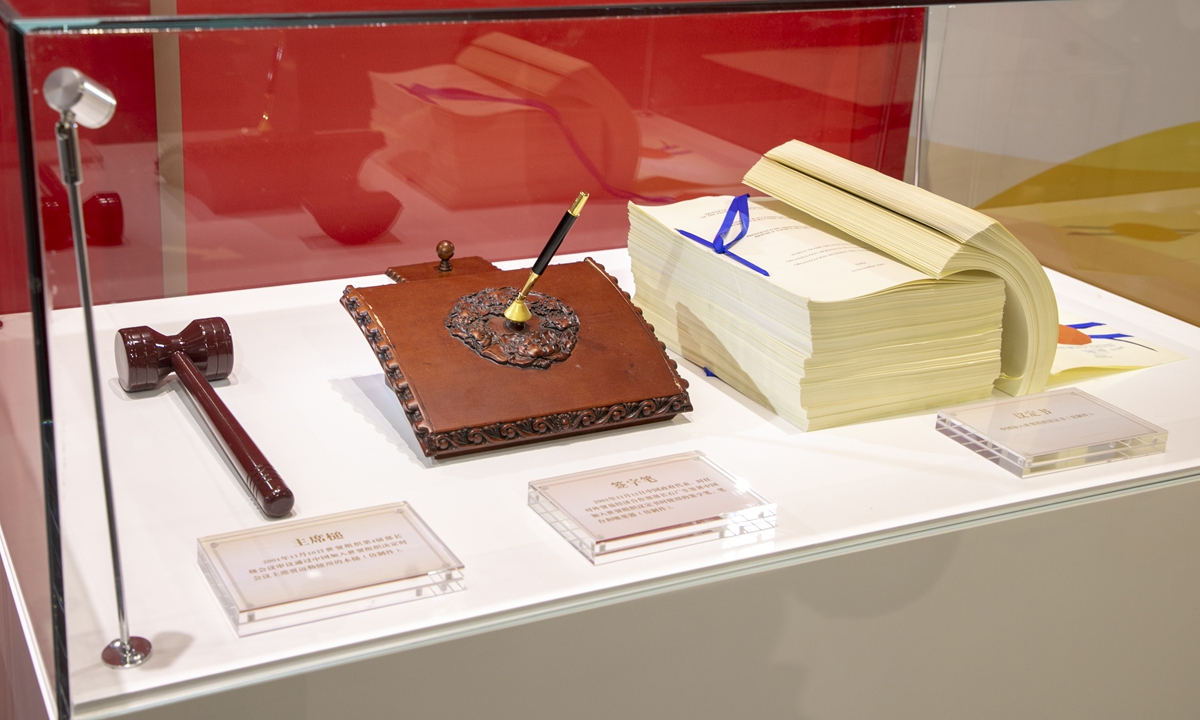
Duplicates of stationery used in the signing of the legal document on China's accession to the WTO, on display during the 4th China International Import Expo in November 2021 Photo: VCG
I will never forget that after that historic bang of the gavel, participants on the podium, including Moore, first stood up and gave their congratulations, then all members of the Chinese delegation stood up and applauded, and the entire audience of more than 700 representatives all stood up and applauded enthusiastically.Representatives from dozens of WTO members, including Pakistan, Cuba, Australia, India, Brazil, Nigeria, Japan, the US, and the European Union, spoke and extended a warm welcome to China.
I will never forget that before every important moment for China, the Chinese delegation was preceded by a scrum of Chinese and foreign journalists at the press center. The corridor outside the venue was jammed, with reporters repeatedly breaking through security "blockades" and even knocking down tables in order to take photos of the Chinese delegation members and ask questions.
The speech text by Shi Guangsheng, head of the Chinese delegation and then Chinese Minister of Foreign Trade and Economic Cooperation, became highly sought-after material in the press center, with foreign journalists seeking help from their Chinese counterparts who could find it.
I caught up with Moore at the end of the Chinese delegation's press conference. He said that he was very happy for the Chinese people on that day. I said to him, "Today, Shi signed the Protocol on China's accession to the WTO with a pen made in China. Would you also like to use a Chinese-made pen to convey what you want to say to the Chinese people through the People's Daily, China's largest newspaper?"
I handed over my pen and he readily signed on my notebook. "Good luck!" he wrote.
The win-win vision
People use "a great historical event" or "a historical step" to define the significance in history of China joining the WTO, and also use "the biggest gain" and "the most pleasant page" to describe the influence of this event to the Doha conference.
There are those who are full of emotion and admiration. An official from the agricultural ministry from the Dutch delegation said to me, "China's accession to the WTO is good news for the whole world. China has negotiated for too long, and China deserves to be a member of the WTO family."
"This is the first milestone of the international community in the 21st Century," a Colombian delegate praised.
In my record, the most frequently used word to describe the event was "milestone."
Some people were relieved and extremely delighted. Hilal, a consultant with the Economic and Social Commission for Western Asia, said that 30 years ago, he witnessed the exciting scene of China's return to the United Nations in New York, and he could witness another important event of China's move toward the international community. "How honored I am!" he said.
A Qatari journalist also shared his excitement with me. "In our country, Qataris are also proud of China being able to complete its 15-year WTO journey to joining the WTO as expected," he said.
Outside the conference hall, I stopped Pascal Lamy, the Commissioner for Trade at the European Commission, and asked him to comment on China's accession to the WTO. Lamy pointed at his secretary and told me to make an appointment.
It was a sheer surprise that only after 20 some days, Lamy visited Beijing and accepted my interview request.
It was Lamy's fourth visit to China as Commissioner for Trade at the European Commission. On that day, Beijing had a small snowfall. Before leaving Beijing, he talked with me about his feelings about this trip in the departures lounge of the airport.
He said he had encountered the coldest weather in China that time, but the atmosphere of the visit was particularly relaxed and warm, because both sides focused on future mutual cooperation, rather than battles at the negotiating table.
Lamy described China's 15-year WTO accession negotiation process as a "Long March" - the result of this "Long March" was China's commitment to further reforms, China's benefits of joining the multilateral trading system, and its core position in the new round of multilateral trading negotiation. Therefore, though having experienced a long journey, China had excellent timing in joining the WTO, he said.
The Millennium Round was not launched at the Seattle meeting, which meant that the timetable for the new round of trade negotiations had been delayed by two years, but it also meant that the whole world was waiting for China to join in before starting new negotiations, he said.
Lamy underlined that the news of China's accession to the WTO and a new round of multilateral trade negotiations boosted the confidence of the global market at a critical moment.
Lamy left a message in my notebook. In his message, Lamy expressed his belief that participating in the world economy will bring more employment opportunities, better life, and greater openness to China, a large country with a long history and rich natural resources, and more importantly, to its people with extraordinary talents.
Four years later, Lamy became chief of staff for the President of the European Commission. He used an "A+" to describe what China had done in the multilateral trading system.
On the occasion of commemorating the 10th anniversary of China's accession to the WTO, in 2011, Lamy admitted that when joining the WTO, China accepted more stringent conditions than other developing countries, but these constraints have allowed China to largely avoid damage from trade protectionism and are beneficial for the development of China's foreign trade.
Lamy put great emphasis on the concept of "win-win" - Who won? Did China win and other countries lose? Or did China lose and others won? The fact is, "China won, and so did other countries."
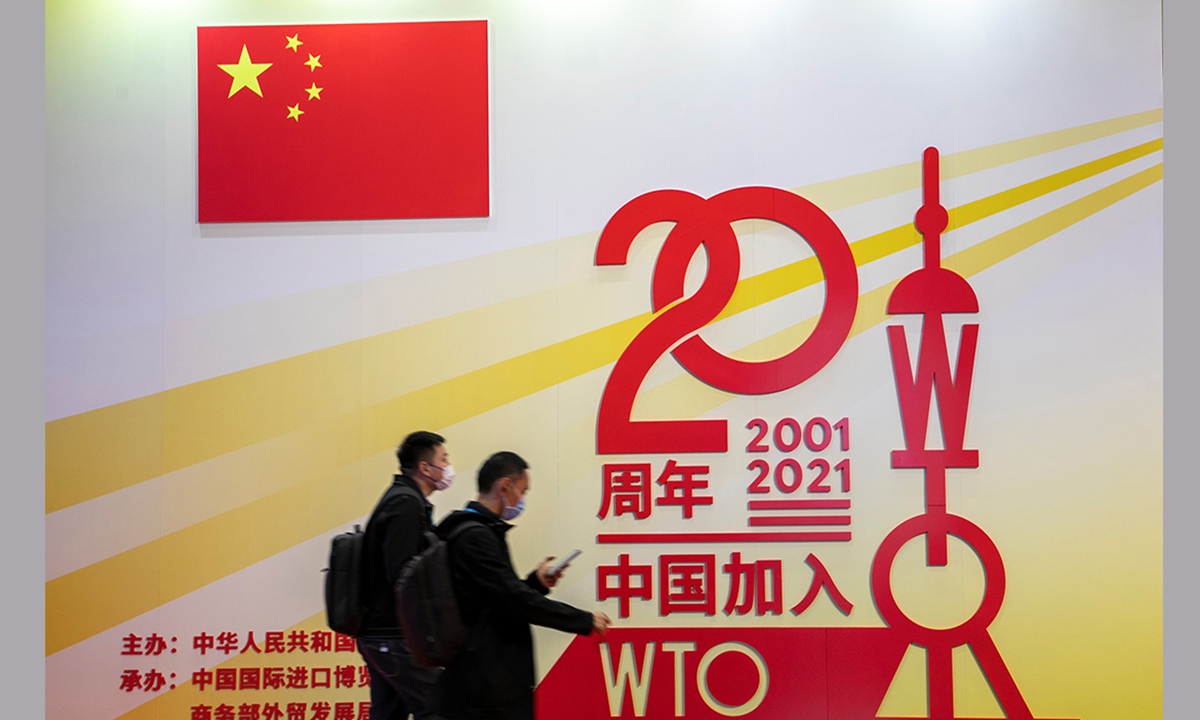
A special exhibition marking the 20th anniversary of China's accession to the WTO is held at the National Exhibition and Convention Center in Shanghai during the 4th China International Import Expo from November 4 to 10, 2021. Photo: VCG
Opportunities in opening up
At the fourth China International Import Expo (CIIE) held in November, a special exhibition on the 20th anniversary of China's accession to the WTO - the protocol, the pen at the signing ceremony of China's accession to the WTO, and the white paper on "China and the WTO" - attracted much attention. It reflected the road China has traveled and has inspired people to applaud openness and win-win progress.
Data and facts fully prove the power of greater openness. The past 20 years since China joined the WTO have been regarded by the international media as China's "20 golden years." Specifically, China's economic size rose from the sixth to the second place in the world, its trade in goods from the sixth to top spot, and its trade in services from the 11th to the second place. Its foreign capital utilization remained the first among developing countries, and its outbound direct investment rose from the 26th to the top of the ranks. At the same time, China's development has injected strong impetus into world economic growth.
"For any country or nation to thrive, it must follow the logic of history and develop in line with the trend of the times," Chinese President Xi Jinping said at the opening ceremony of the fourth China International Import Expo. This is the truth that stands the test of time. This is the truth that stands the test of time.
Under the current environment of a declining "World Openness Score" and weakening global consensus on openness, people should clearly identify risks and bravely resist adverse trends. In particular, we need to firmly create opportunities through openness and solve difficulties through cooperation, so as to make economic globalization more open, inclusive, balanced, and beneficial to all, and deliver benefits to all countries and people.

China's 20 years in the WTO Infographic: GT
